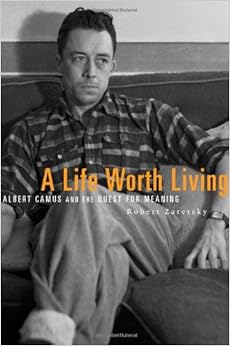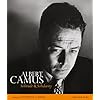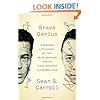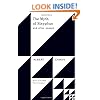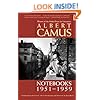Enlightening…
Zaretsky probes Camus’s multifaceted sensibility. (John Taylor
Times Literary Supplement 2013-11-08)
A Life Worth Living departs from the chronological approach… Instead,
Zaretsky tells [Camus’s] story according to the five themes that preoccupied his life and work: absurdity, silence, measure, fidelity, and revolt. The result is a much more human portrait of a man whose life is often reduced to a meditation on the bleakness of absurdism. By chronicling the ideas rather than the events of Camus’s life, Zaretsky shows that ‘Camus was all too human: an obvious point that our desperate need for heroes, especially now, often obscures.’ (Linda Kinstler
New Republic 2013-11-08)
This is a wonderful introduction to Albert Camus and an overview for those who have already read him.
Zaretsky effortlessly explores sometimes difficult concepts in an accessible, even conversational study that blends significant aspects of Camus’ life—his Algerian background, life in France, the importance of the war; the Resistance and the TB that afflicted him for much of his life—with his works, in such a way that it offers a strong sense of the writings and the writer… The result is a concise portrait of an intellectual deeply concerned with ethics, but with an abiding love of the sensual, and life’s beauty. (Steven Carroll
Sydney Morning Herald 2013-12-14)
Some writers are lucky enough to be remembered 50 years after they die, and a few are even beloved. What is vanishingly rare, however, is for a long-dead writer to remain controversial. Albert Camus is one of those exceptions, a writer who still has the power to ignite political passions, because he managed to incorporate the history of the 20th century so deeply into his writing…Readers new to Camus will find in
Zaretsky a deeply informed and warmly admiring guide. (Adam Kirsch
Daily Beast 2013-10-20)
It is extremely limiting to think of Albert Camus as an existentialist philosopher of the absurd. While Camus was never trained as a philosopher,
Zaretsky demonstrates that many other themes marked Camus’s thought. Camus was a highly principled person, and a strong advocate for justice…Camus’s voice still has resonance. (
Christian Century 2013-11-04)
More than a half-century after his untimely death in 1960 at age 46, Camus continues to engage us…
Zaretsky provides thorough and rigorous examinations into the author’s life and work while also helping us understand the disquiet of a man who gave readers seeking sustenance in art some of the most lyrical and encouraging advice in 20th-century literature. (Kevin Rabalais
The Australian 2013-11-02)
For a good short study of [Camus’s] life, work and philosophy, try
Robert Zaretsky’s
A Life Worth Living: Albert Camus and the Quest for Meaning. (Stephen Romei
The Australian 2013-12-14)
The centenary [of Albert Camus] has spurred books, papers and reconsideration of his contributions to literature and his times.
Robert Zaretsky’s is one of the best. The Algerian-French Nobel Prize winner, known for novels such as
The Stranger and
The Plague and essays including ‘The Myth of Sisyphus’ and ‘Reflections on the Guillotine,’ wrote piercingly and urgently about facing injustice, the need for revolt, confronting absurdity and the search for meaning. Zaretsky underscores why the ideas of Camus, who died in a car accident in 1960, remain important today. (Peter M. Gianotti
Newsday 2013-12-27)
Offer[s] concise, eloquent, and learned treatments of the life and work of the French-Algerian moralist…Camus contained multitudes and…
Zaretsky returns to this truth again and again. (Barry Lenser
PopMatters 2013-11-21)
What emerges is the paradoxical portrait of an exceptional everyman: imperfect, plagued by doubt, melancholic, flawed, but also sensitive, hopeful, passionate and heroic…
A Life Worth Living reveals much about Camus, the times he lived in and wrote against…Those looking for a better understanding of the context in which Camus penned his books and essays on murder, torture, suicide, silence and rebellion will find much to ruminate on…
Zaretsky is especially adept at seamlessly weaving Camus’ own words into the text, and the result is that the reader feels almost as though she is reading Camus as opposed to a biographer…Zaretsky’s book is good reading for dark times, a wonderfully written monograph about an absurd hero whose life serves as a reminder that, ‘while we have no reason to hope, we must also never despair.’ (Jon Morris
PopMatters 2013-12-10)
Zaretsky identifies Camus as a moralist, not a moralizer, one who poses questions rather than imposes answers. Like such courageous moralists as Montaigne, Voltaire, Hugo and Zola, Camus extended his private quest for truth into the public sphere…In pithy prose worthy of his subject, Zaretsky reminds us that, in an age of suicide bombings and state-sanctioned murder, Camus is an author worth reading. (Steven G. Kellman
Texas Observer 2013-12-17)
Zaretsky delivers a lucid perspective on the intellectual provenance of the writer’s moral philosophy through an examination of
Notebooks,
The Myth of Sisyphus,
The Rebel,
The Plague, and
The Stranger. His scrutiny converges on Camus’s sense of the fundamental absurdity of life and why suicide is not an option; his sensitivity to the positive and negative aspects of silence; his understanding of the human condition; and his conviction that rebellious response to injustice be measured, not extreme…An admirable, comprehensible introduction to Camus. (Lonnie Weatherby
Library Journal 2013-12-13)
Zaretsky offers an invigorating blend of history, criticism, and biography in a stirring reassessment of the Nobel Prize–winning existentialist writer Albert Camus… Zaretsky demonstrates Camus’s commitment to justice and the joy of existence, evident in his rejection of Soviet communism, as well as his principled opposition to terrorism and capital punishment. Camus emerges as a compassionate thinker who always ruthlessly interrogated his own beliefs and assumptions. Zaretsky’s elegant prose and passion for the subject, meanwhile, will inspire both novices in existentialism as well as experts to revisit the contributions of this great French writer. (
Publishers Weekly 2013-07-08)
A marvelously wise, concise, and adventurous exploration of Camus, his intellectual antecedents, the battles that raged around him, and his continuing power to unsettle and inspire us to this day. (Sarah Bakewell, author of
How to Live: A Life of Montaigne)
Zaretsky brings to light in this wonderfully readable intellectual biography of the iconoclastic
pied noir the continued relevance of Camus in contemporary life…This volume offers a portrait of Camus not simply as an existentialist (as is typical) but rather as a ‘Mediterranean humanist’ disillusioned by the world’s failure to live up to its purest ideals. (L. A. Wilkinson
Choice 2014-05-01)
